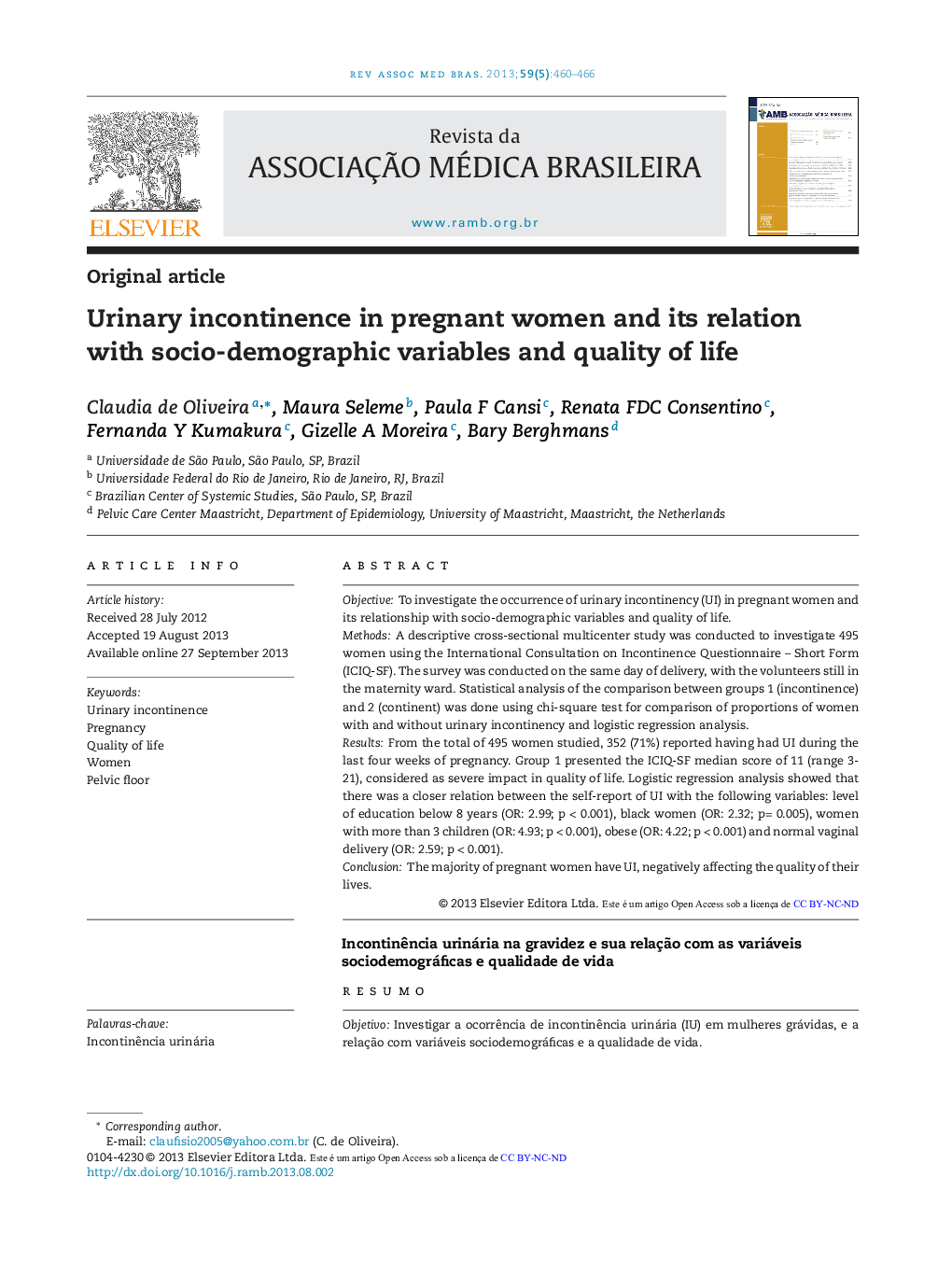| کد مقاله | کد نشریه | سال انتشار | مقاله انگلیسی | نسخه تمام متن |
|---|---|---|---|---|
| 3826232 | 1246869 | 2013 | 7 صفحه PDF | دانلود رایگان |

ObjectiveTo investigate the occurrence of urinary incontinency (UI) in pregnant women and its relationship with socio-demographic variables and quality of life.MethodsA descriptive cross-sectional multicenter study was conducted to investigate 495 women using the International Consultation on Incontinence Questionnaire – Short Form (ICIQ-SF). The survey was conducted on the same day of delivery, with the volunteers still in the maternity ward. Statistical analysis of the comparison between groups 1 (incontinence) and 2 (continent) was done using chi-square test for comparison of proportions of women with and without urinary incontinency and logistic regression analysis.ResultsFrom the total of 495 women studied, 352 (71%) reported having had UI during the last four weeks of pregnancy. Group 1 presented the ICIQ-SF median score of 11 (range 3-21), considered as severe impact in quality of life. Logistic regression analysis showed that there was a closer relation between the self-report of UI with the following variables: level of education below 8 years (OR: 2.99; p < 0.001), black women (OR: 2.32; p= 0.005), women with more than 3 children (OR: 4.93; p < 0.001), obese (OR: 4.22; p < 0.001) and normal vaginal delivery (OR: 2.59; p < 0.001).ConclusionThe majority of pregnant women have UI, negatively affecting the quality of their lives.
ResumoObjetivoInvestigar a ocorrência de incontinência urinária (IU) em mulheres grávidas, e a relação com variáveis sociodemográficas e a qualidade de vida.MétodosEstudo multicêntrico do tipo descritivo, transversal, a fim de verificar por meio do International Consultation on Incontinence Questionnaire – Short Form (ICIQ-SF) a IU em 495 mulheres. Os dados foram coletados no dia do parto, nas maternidades elegidas. A comparação das proporções entre os grupos 1 (incontinente) e 2 (continente) foi realizada pelo teste de qui-quadrado e a verificação das variáveis que mais se associavam com a IU por análise de regressão logística.ResultadosNo total 71,11% (352) apresentaram IU durante as últimas quatro semanas de gestação. O grupo 1 apresentou escore do ICIQ-SF de 12,11 (min. = 3 e máx. = 21), considerado severo impacto na qualidade de vida. Na análise multivariada de regressão logística encontramos maior relação entre o relato de IU com as seguintes variáveis: escolaridade abaixo de 8 anos (OR: 2,99; p < 0,001), raça negra (OR: 2,32; p= 0,005), mulheres com mais de 3 filhos (OR: 4,93; p < 0,001), obesas (OR: 4,22; p < 0,001) e parto normal (OR: 2,59; p < 0,001).ConclusãoA maioria das mulheres tinha IU, afetando sua qualidade de vida negativamente.
Journal: Revista da Associação Médica Brasileira - Volume 59, Issue 5, September–October 2013, Pages 460–466